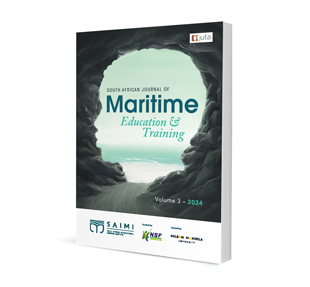
Assessment of Digital Competencies in South African Maritime Education and Training Institutions: A Study of Evaluation Methods for Future Seafarers
Author: Dineo Cleo Mke
ISSN: 2790-783X
Affiliations: MSc in Maritime Affairs Graduate (2024), World Maritime University, Malmö, Sweden; South African Maritime Safety Authority (SAMSA),
South Africa
Source: South African Journal of Maritime Education and Training, Volume 3 Issue 1, p. 103-120
https://doi.org/10.47348/SAJMET/2024/i1a8
Share
Cite this article
Dineo Cleo Mke
Assessment of Digital Competencies in South African Maritime Education and Training Institutions: A Study of Evaluation Methods for Future Seafarers
South African Journal of Maritime Education and Training, Volume 3 Issue 1, p. 103-120 https://doi.org/10.47348/SAJMET/2024/i1a8
Abstract
The fourth industrial revolution (4IR) and the Covid-19 pandemic have significantly impacted the global maritime industry, requiring maritime education and training (MET) institutions to adapt to new digital competencies. While 4IR created awareness of digital competencies as a key to drive digitalisation, the Covid-19 pandemic ‘forced’ us to adapt to new situations. The rapid changes in the maritime industry, driven by technological advancements, are resulting in future seafarers requiring digital competencies, and South African MET institutions are faced with delivering seafarer training for students entering this environment. The study aimed to identify the skills required for seafarers in the digital era and to evaluate the preparedness levels of MET institutions to address this need in courses that offer such skills in the context of South Africa. Best practices in assessing digital competencies in South African MET institutions and identify gaps in current practices were also investigated. The study explored the alignment of identified critical digital competencies with the constructs of the various evaluation methods used to assess these competencies. A qualitative research methodology was employed, using a phenomenological approach to examine the experiences of South African MET professionals regarding digital competency assessment practices. Semi-structured interviews were conducted with seven representatives from MET institutions, encompassing managerial and operational levels. The findings highlight the need for improved guidelines, industry collaboration and staff development to address skills shortages and to align with global standards. Enhanced frameworks and continuous updates are essential to equip seafarers with the technical proficiency required for the rapidly digitalizing maritime industry, ensuring their readiness to navigate evolving technological and operational landscapes. The study concludes by emphasising the need for standardised competency frameworks, updated curricula, enhanced simulators and international collaborations to align MET institutions to global standards.